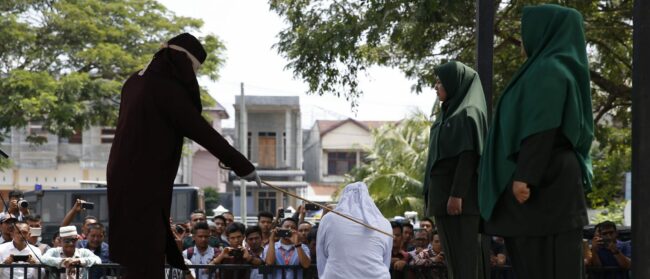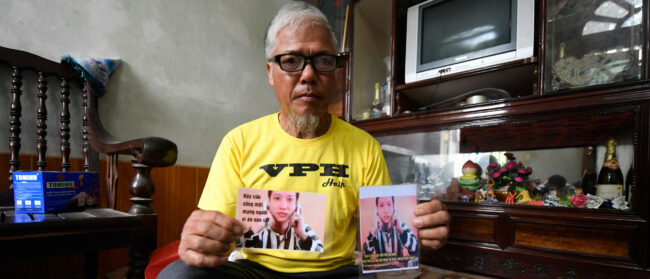Editor’s note: A nine-year-old boy sits broken in a bullet-riddled car. Outside, the police pursue his mother through the sweating night, his father’s body still cooling in the dirt. Today, this scene calls to mind the slums of Davao or the backstreets of Manila, as Philippine President Rodrigo Duterte’s drug war continues to sanction sprees of extrajudicial killings of some of the poorest members of society. In the early years of the millennium, though, these murders were carried out in the name of another wildly popular politician: Thailand’s Thaksin Shinawatra. In 2007, Southeast Asia Globe spoke to the people still fighting for justice in the wake of a bloody crackdown that saw men, women and children gunned down with impunity by the Thai police. Now, for the first time, you can read their stories online.
On the night of February 23, 2003, a family of three never returned to their home in the northern outskirts of Bangkok. Four years later, 48-year-old Somchai Kertrungrueng, uncle of then 9-year-old Chakraphan Srisaard, watches a group of children playing from the balcony of their one-bedroom apartment and recalls what happened.
“If the boy was still alive, he would be playing here with his bicycle right now,” he says. At 9PM that night, Chakraphan’s father made a delivery of methamphetamines to an undercover policeman. Waiting nearby in the car, his wife Pornwipa saw the police arrive. As she panicked and tried to flee, her car was riddled with bullets. Two bullets hit little Chakraphan and allegedly killed him instantly. Pornwipa continued her escape on foot and has never been heard from since.
Both the police and Kertrungrueng agree on this much of the story, but from there the details get murky. The police asserted that they only shot in the air and that the lethal gunshots came from a motorbike that mysteriously appeared. Witnesses, however, said that the police fired their guns directly into the car. The police also claimed to have no knowledge of the whereabouts of Chakraphan’s mother, Pornwipa, but witnesses stated that they saw her taken by the police while hiding at a nearby roadside market.

“I still have hope, I have visited several fortune tellers and they have all told me that my sister is still alive,” says Kertrungrueng.
National Human Rights Commissioner Vasant Panich does not share that hope. “She is probably dead. I don’t think the police would have fed her for four years,” he says.
In January 2003, Thailand’s then-prime minister Thaksin Shinawatra declared war on Thailand’s drug trade. In the following months more than 2,500 people were killed as the police cracked down on drug producers and small-time drug dealers nationwide. While the campaign was overwhelmingly supported by ordinary Thais fed up with the prevalence of drugs in their society, human rights defenders quickly pointed out that gross human rights violations were taking place at the hands of the police.
“What we are trying to do is to establish that Thaksin was responsible for what happened during this period. He mentioned many times that there were only two alternatives for the drug dealers. One was prison, the other was the temple [death],” says Vasant Panich, who claims that at least 1,000 of the victims were innocent, and had no involvement in the drug trade whatsoever.

While Thaksin maintains that most of the deaths were caused by drug dealers killing each other, a letter from the Ministry of the Interior to Thailand’s provincial governors, dated February 21, 2003, suggests a different story. The letter spells out how local authorities and police should deal with drug suspects on blacklists compiled by local authorities.
“The drug dealers are our enemies. Even if they are our relatives they are considered enemies. Drug dealers are traitors to the nation. We have to get rid of them. Don’t give them mercy because they destroy the Thai people, the nation and the religion,” reads one paragraph in the letter that goes on to describe operating procedures on how to reduce the number of suspects in the blacklists. “The target can be met in three ways, either by arrest, by extrajudicial killing, or death by other means,” reads the letter.
“Of course this should be sufficient evidence,” says former senator Kraisak Choonhavan. “The question is to what capacity the law in Thailand protects high-ranking criminals. First, I would have to file the case to the police. The police will then accept or not accept it and refer it to the attorney general. If the attorney general thinks the case has enough evidence he will send it to court. But if the police work for Thaksin, then we do not have a chance, do we?”
“I know for a fact that there are four or five families who have tried again and again to get through this process with absolutely no success,” he adds.

Thaksin’s fall from power in last October has however created new hopes. Human Rights Commissioner Vasant Panich says more witnesses and relatives of the victims have come forward in the aftermath of the coup. Four cases, including the killing of Chakraphan and the disappearance of his mother, have been brought for renewed investigation to the Department of Special Investigation (DSI). The DSI have told the press that they have evidence linking the police to extrajudicial killings. Justice Minister Charnchai Likhitjittha has stated that DSI will look at accepting more cases if victims come forward.
Vasant Panich says the human rights commission has prepared an additional 50 cases to be handed over to the Ministry of Justice. “It is out of my hands now, all I can do is to propose the cases to the Ministry,” he says.
Kraisak Choonhavan is less impressed with Thailand’s present rulers. “It [human rights] doesn’t seem to be on the agenda of the military junta, nor of the government established by the coup. They seem to be focused on corruption rather than the more pressing issue of human rights, which is by all means the most notorious aspect of Thaksin’s government,” he says, adding: “I have told the prime minister that if justice is not done on these extreme cases, Thailand has no future in its drive towards democracy.”
Another issue hampering the process is lack of material evidence. Celebrity pathologist Pornthip Rojanasunan of the Central Institute of Forensic Science in Thailand, one of the few observers who at that time dared to raise her voice against the killings, says the drug killings were never investigated properly. “In some cases I found that the scene of the crime had been arranged, packages of methamphetamines had been placed on the body where the dead could not have put them. And we saw in many cases that something had been moved at the crime scene,” she says.
Rojanasunan admits that she has never come across concrete evidence pointing to execution style killings by the police. “I just found that the police didn’t do the investigation in the right way. They did nothing, even when we showed them that someone had arranged the scene. This means that they didn’t want to do a good investigation, or maybe that they knew who was behind the killing,” she says.
She does not think the relatives of the victims will ever see justice. “In my opinion we can not solve this. The crime scene investigation and the collection of evidence was not done in a very good way. This duty belonged to the police. If they didn’t collect the bullets, DNA, or other evidence, how can we match the case, and how can we find the murderer who killed?” she says.
Kertrungrueng still hopes that the truth of what happened to his nephew and his sister finally will come out. He says more witnesses and new evidence has been brought forward after the case was submitted to the DSI. “The DSI has given me their word that they will find Chakraphan’s killer,” he says.
He tells a story about Chakraphan’s last assignment at school, where the teacher had asked the boy what he wanted to become when he grew up. In his exercise book he made a drawing of himself chasing a thief. Below he had written: “I want to be a policeman because they catch all the bad people.”


